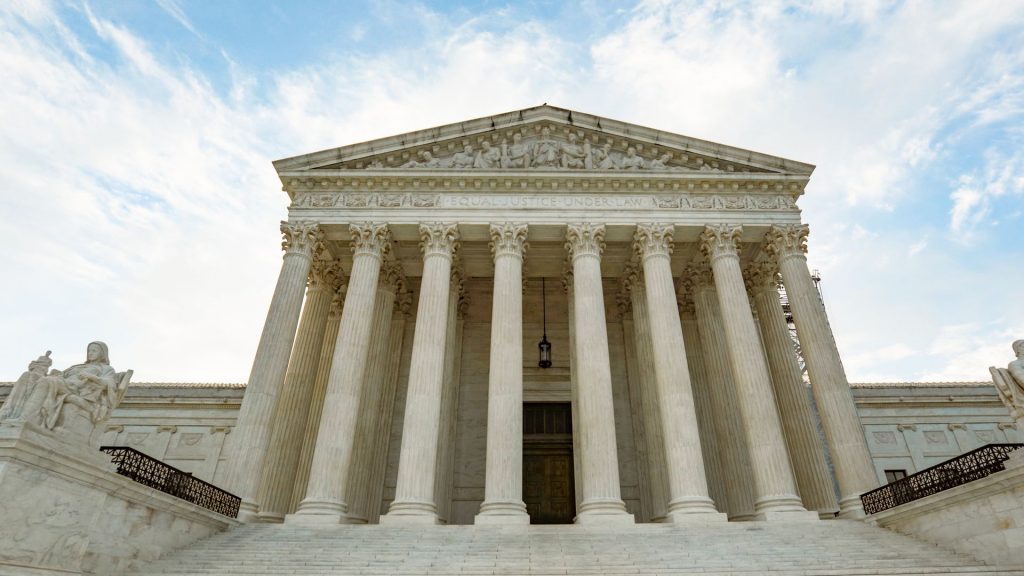SCOTUS: Trump officials must pause deportations under Alien Enemies Act

The U.S. Supreme Court stepped in to block the immediate removal of Venezuelan detainees linked to a foreign terrorist group, ruling that the Trump administration must provide clearer and more timely notice before deportation under a rarely used wartime law. Under the Alien Enemies Act of 1798, the federal government has accelerated the process of mass deportation efforts of migrants illegally in the U.S.
On Friday, May 16, the court issued a temporary injunction but didn’t address the legality of the individuals being removed. Instead, the justices focused on whether detainees were given enough notice to exercise their legal rights.
“We recognize the significance of the Government’s national security interests as well as the necessity that such interests be pursued in a manner consistent with the Constitution,” the court wrote.
Background on the case
At the center of the case are two Venezuelan nationals and a group of detainees held in Texas, whom the government alleges are affiliated with Tren de Aragua. The White House designated the group as a foreign terrorist organization through a March 15 executive order.
According to the court’s ruling on April 17, a district court judge denied the detainees’ request for a temporary restraining order to block their removal. Hours later, detainees reported receiving notifications that they could be deported that night or the next day.
On April 18, the detainees filed an emergency motion to halt their removal from the U.S., which included an urgent hearing and an appeal. However, the Supreme Court said the lower courts denied their motions and didn’t take immediate action.
The detainees then turned to the Supreme Court in a last-ditch effort. Minutes before deportations were expected to begin, the justices issued an emergency order on April 18 blocking any removals of the individuals involved in the case. The court paused the deportations.
The Supreme Court said the move was necessary to preserve its jurisdiction while it considered the legal questions raised because if they are deported, the U.S. will no longer have authority.
Case brings up issue at hand: due process
The central legal question is whether the government gave the detainees due process to challenge their removal. The court noted that the individuals only received a 24-hour notice, but there was no guidance on legal counsel or how to file court motions.
The court said the plaintiffs in this case, “are entitled to constitutionally adequate notice prior to any removal, to pursue appropriate relief.
The justices said that a detainee must have “sufficient time and information to reasonably be able to contact counsel, file a petition, and pursue appropriate relief.”
The ruling said due process rules are in place to protect against the mistaken or unjustified deprivation of life, liberty or property.
Grants class-wide relief to migrants in custody
In a 5-4 vote in April, the Supreme Court lifted a restraining order that stopped these deportations from taking place, only if detainees were given the ability to challenge their pending deportation to El Salvador’s prison, CECOT.
With Friday’s ruling, the justices proposed class-wide relief for migrants in custody in Texas. In this case, it applies to a group of individuals rather than an individual.
Supreme Court says lower courts erred
The Fifth Circuit Court of Appeals had dismissed the detainees’ appeal, arguing that they had given the district court just 42 minutes to act. However, the Supreme Court rejected that view, noting the district court had remained inactive for over 14 hours after the emergency motion was filed.“
“Accordingly, we vacate the judgment of the Court of Appeals,“ the justices wrote. “The Fifth Amendment entitles aliens to due process of law in the context of removal proceedings.”
What does the dissenting opinion say?
The court’s opinion was unsigned and labeled “per curiam,” meaning it reflects the view of the Court as a whole. However, Justices Samuel Alito and Clarence Thomas dissented to certain portions of the decision, arguing that the court had overstepped by intervening without a complete record from the lower courts.
Both argue that the Supreme Court lacks jurisdiction and cannot formulate a ruling or decision based on the case.
They also write that the characterization of events leading up to the detainees’ deportations is “misleading.” In his dissent, Justice Alito pushed back on the Supreme Court’s portrayal of the district court’s response to an emergency deportation motion, calling the majority’s claim of “inaction” unfair.
Alito called that approach a dramatic and unwarranted break from standard legal practice. Court records show the detainees’ lawyers called the judge on April 17 requesting immediate action, which the judge declined, citing rules against contact.
He instead issued an order instructing both sides to follow current procedures and gave the government 24 hours to respond to any emergency motion. The lawyers filed their motion at 12:34 a.m. on April 18 but, by 12:48 p.m., asked for a ruling within 42 minutes.
“Act on my motion on a complex matter within 42 or 133 minutes or I’ll file an appeal and divest you of jurisdiction, represented a very stark departure from what is usually regarded as acceptable practice,” Alito wrote.
He argued the district judge acted reasonably and was preparing to rule once the government filed its response.
What happens next?
The case now returns to the Fifth Circuit for a detailed review of what due process protections should apply to detainees facing removal under the Alien Enemies Act. Until that question is resolved, the government remains barred from deporting the detainees without providing adequate notice.




